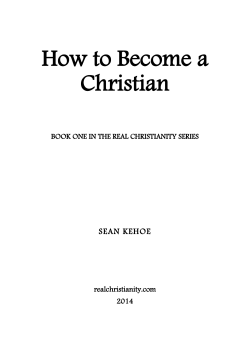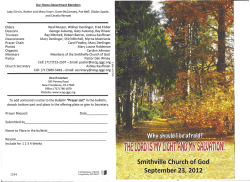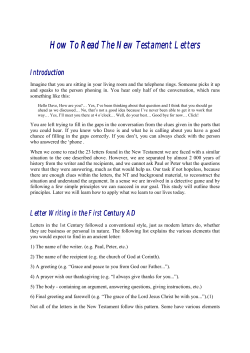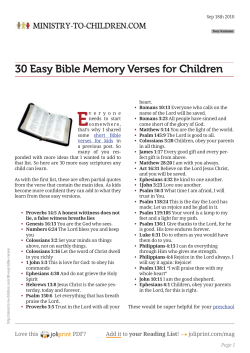
“HOW TO DO AN INDUCTIVE BIBLE STUDY” BY CHUCK WYNN
“HOW TO DO AN INDUCTIVE BIBLE STUDY” BY CHUCK WYNN The aim of personal Bible studies is: life-change! Step 1: Observation (What does the Bible say?) Read the whole book through several times. Get a good sense of the overall view and flow of the book as a whole. This will help you to get a sense of the book’s theme and purpose. Select a paragraph that you want to focus in on. Read each verse in that paragraph, asking & answering questions using the 5 W’s and 1 H: Who? What? When? Where? Why? How? Use grammar rules to aid you in understanding what a verse says. Also, look for any literary devices the author may be using (compare/contrast, Q&A; lists; dialogue, etc.) Move from smaller pieces of the text to the larger: Verse Paragraph Chapter Stories Book Books written by same author Books in same Testament (OT/NT) Bible Examine what genre of literature the passage is (Narrative? Poetry? Wisdom literature? Oracle? Epistle? Apocalyptic?) The type of literature has a strong bearing on how the passage is to be interpreted! Spend the majority of your time in observation of the passage! Interpretation becomes so much easier and is more accurate when this is done! “How to do an Inductive Bible Study” | Chuck Wynn | Riverview Church | http://www.eriv.net | Page 1 of 4 Step 2: Interpretation (What does the Bible mean?) Use the literal, grammatical, historical means of interpretation Ask, “What did the author intend to communicate to his original audience?” Be careful of reading our own cultural biases or theological presuppositions into the text! Allow the text to speak for itself rather than reading a meaning into the text! Recognize that there are some things in the Bible that just aren’t as clear as we’d like them to be. We need to be humble and live with a degree of uncertainty on some nonessential issues. We also need to be humble and recognize that there are doctrines that the Bible is very clear about (ex. Deity of Christ; salvation by grace through faith alone). Remain committed to a doctrinal position to the degree that the evidence allows you to! Step 3: Application (How do I apply this to my life?) Ask, “What principles can be taken from the text?” Take those principles and commandments given and ask: “Is this time & situation specific, or does the Bible as a whole teach this as a timeless, non-specific principle?” “Is the principle culturally-bound or not?” “How should we apply these principles in our lives today?” Suggested Tools for Inductive Bible Study 1 A good translation of the Bible: I recommend that a student uses at least three different translations when studying the Bible, as every translation has certain strengths and weaknesses that can be offset by a different one. I would suggest the New American Standard Bible (’95 Update) (NASB); the New International Version (NIV); and the New Living Translation (NLT). All three translations are based on a superior Greek text than the King James or New King James Versions. The differences in their philosophy of translation (literal, word-for-word versus thought for thought) allows these three to compliment one another. Other good translations that could be consulted are: The English Standard Version (ESV); The New Revised Standard Version (NRSV); The Tanakh (OT only); and The Modern Language Bible (updated Berkeley version). The Message or the J.B. Phillips’ New Testament in Modern English, while helpful for devotionals, are paraphrases done by one person and so are inadequate resources for in-depth Bible study. 2 An Exhaustive Concordance: this will allow you to do word studies and comparisons. This is an easy-to-use, essential tool in studying the Bible. 3 Bible Dictionary: This will allow you to look up and study a variety of topics, such as geography, “How to do an Inductive Bible Study” | Chuck Wynn | Riverview Church | http://www.eriv.net | Page 2 of 4 people, places, customs, etc. A very handy tool to have to help you understand more of a particular topic (ex. Slavery in NT times) 4 Manners and Customs of Bible Times: Provides helpful background information that explains and clarifies the meanings of customs described in the Bible. 5 Commentaries and Bible handbooks: These may be helpful to check your conclusions with scholars that also study the Bible. These should be consulted only after you’ve studied and reached some conclusions as to the meaning of the text. Remember: commentaries are intended to be a guide, not to be an “answer key” to the meaning of the biblical text. Don’t make the mistake of treating them as such! The Role of the Holy Spirit in Bible Study The Bible is more than a collection of 66 books written over a period of 1500 years. It is more than the opinions of forty authors writing about a variety of subjects. It is more than a piece of literature that has shaped and influenced civilization on a worldwide scale. The Bible is the Word of God itself, and claims as its source God Himself. As such, every single word written in the Bible came from the Holy Spirit, who superintended the writing of each book through its human author. That is why, for all its diversity, the Bible collectively reads as one story: the story of God glorifying Himself through the redemption of His Creation. The Holy Spirit is absolutely essential in helping us understand the message of the Bible. As the Author, He is the one who intimately knows His Word. As the believer’s Helper sent to guide us into truth, His ministry in our lives is to help us understand the teachings of Scripture so that we can obey His will in all things. Apart from His work of illuminating our minds, we are incapable in and of ourselves to discern spiritual truths. Because of these things, we need to have a spirit of dependency and yieldedness to the Lord when approaching studying the Bible. We need to have a heart that is quick to hear and obey whatever truths He reveals to us in His Word. Hearing the truth and not putting it into practice results in self-deception (James 1:22). The Lord desires to speak to us through His Word, but we need to understand that He speaks to us in order for us to respond in faith and obey Him. In light of this, it’s important that we cultivate the following: A heart of prayer: I need to be spending time with God concerning the things He is revealing to me from His Word. If a deepening understanding of Scripture isn’t resulting in a deepening relationship with the Lord, then something is amiss. The goal in studying the Word is to be transformed by it, bringing honor and glory to my Lord! A heart of humility: I need to be humble towards God and be willing to obey whatever He shows me from His Word. I need to be humble towards the Word itself in allowing it to speak rather than trying to make it say what I want it to. And I need to be humble towards other believers who may have a different understanding of the teachings of Scripture than I do. We will never have complete understanding in this life; in fact, Paul says that in many ways we’re like children who see things darkly (1 Cor 13:11-12). We will not have total clarity of vision until we are with the Lord. Therefore, we ought to hold firmly to our convictions while being charitable towards those with whom we may disagree with on the nonessential issues. “How to do an Inductive Bible Study” | Chuck Wynn | Riverview Church | http://www.eriv.net | Page 3 of 4 "It ain't the parts of the Bible that I can't understand that bother me, it is the parts that I do understand." -Mark Twain This work is licensed under a Creative Commons License (for more information, please see http://creativecommons.org/licenses/by-nc/2.0/) ! ! “How to do an Inductive Bible Study” | Chuck Wynn | Riverview Church | http://www.eriv.net | Page 4 of 4
© Copyright 2025









